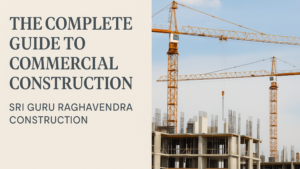
The Complete Guide to Commercial Construction
Embarking on a commercial construction project is a significant undertaking. Whether you’re planning a new office building, a retail space, an industrial facility, or any other structure intended for business use, the process involves numerous stages, complex regulations, and critical decisions. It’s a journey that requires careful planning, expert execution, and a clear understanding of what lies ahead. This guide is designed to be your ultimate resource, a central hub covering everything you need to know about commercial construction in Bangalore.
In the bustling landscape of Bangalore, where businesses are constantly growing and evolving, well-executed commercial building construction is vital for creating functional, efficient, and inspiring spaces. Unlike residential projects, commercial construction involves unique challenges and opportunities, often dealing with larger scales, specific operational requirements, and stringent safety and accessibility standards.
This comprehensive guide will walk you through the fundamentals, the different types of projects you might encounter, the typical phases of a commercial construction project, key factors to consider before breaking ground, and most importantly, how to choose the right partners to bring your vision to life. By the end of this guide, you’ll have a solid foundation of knowledge to confidently approach your next commercial construction building endeavour.
What Exactly is Commercial Construction?
At its core, commercial construction involves building and renovating structures intended for business or non-residential purposes. This broad category encompasses a wide array of projects, distinct from residential building primarily in their scale, complexity, intended use, and regulatory requirements.
Think about the buildings you interact with daily for work, shopping, healthcare, or entertainment. These are all products of commercial construction. The focus is on creating spaces that facilitate commerce, services, industry, or community activities, designed not just for aesthetics, but for functionality, durability, safety, and compliance with specific business needs and public access standards.
The scope of commercial construction can range from small-scale renovations and interior fit-outs for existing buildings to the development of sprawling complexes and high-rise structures. Each project presents its own set of unique demands, requiring specialised knowledge, skilled labour, and robust project management.
Exploring the Diverse Types of Commercial Buildings
The world of commercial construction is incredibly varied, reflecting the diverse needs of the economy. Understanding the different types of commercial buildings helps in appreciating the specific requirements each project demands. Here are some of the most common categories:
-
Office Buildings:
From single-story units to multi-story skyscrapers, office buildings are designed to house businesses and administrative functions. Their construction focuses on creating flexible workspaces, often incorporating advanced HVAC, electrical, and data networking systems. Interior layouts need to facilitate collaboration, privacy, and efficient workflow.
-
Retail Spaces:
This includes everything from small storefronts and restaurants to large shopping malls and supermarkets. Retail construction prioritizes accessibility, visibility, customer flow, and often specific branding requirements. The design must be inviting and functional for both shoppers and staff.
-
Industrial Facilities:
Warehouses, factories, manufacturing plants, and distribution centres fall under this category. Industrial construction is often driven by specific operational needs, such as large open spaces, high ceilings, heavy-duty flooring, specialized ventilation, and loading dock requirements. Durability and efficiency are paramount.
-
Hospitality Buildings:
Hotels, motels, resorts, and event venues require construction that balances guest comfort and aesthetics with high operational efficiency and safety standards. This involves complex plumbing, electrical, and fire safety systems, along with attention to interior finishes and amenities.
-
Institutional Buildings:
Schools, universities, hospitals, government buildings, and religious centres are built with public service or community functions in mind. Their construction is heavily regulated and must prioritize safety, accessibility (often requiring adherence to specific standards like those for persons with disabilities), and long-term durability. Specialized requirements, like sterile environments in hospitals or acoustic treatments in auditoriums, add layers of complexity.
-
Mixed-Use Developments:
Increasingly popular in urban areas like Bangalore, these projects combine multiple functions within a single structure or complex, such as retail on the ground floor, offices above, and residential units higher up. These projects require sophisticated planning and construction techniques to integrate disparate uses seamlessly.
Each type of commercial building construction demands specific expertise. A firm skilled in building retail spaces might approach an industrial project differently, highlighting the need to partner with commercial construction companies that have relevant experience.
The Lifecycle of a Commercial Construction Project
While specific details vary, most commercial construction projects follow a similar lifecycle, moving through distinct phases from initial concept to final handover. Understanding these stages is crucial for effective planning and management.
-
Planning and Feasibility:
This is the foundational stage. It involves defining the project’s goals, scope, and budget. Site selection, zoning analysis, preliminary designs, and feasibility studies are conducted to determine if the project is viable and aligns with business objectives. This phase requires significant input from the client, architects, and potentially a commercial building contractor for early cost estimates and constructability reviews.
-
Design Phase:
Architects and engineers (structural, mechanical, electrical, plumbing, civil) develop detailed blueprints, specifications, and drawings. This phase translates the initial concept into a technical plan. It involves multiple revisions and approvals, including securing necessary permits from local authorities like the Bruhat Bengaluru Mahanagara Palike (BBMP). This is where the aesthetic vision meets engineering reality.
-
Pre-Construction Phase:
Once designs are finalised and permits are in hand, the pre-construction phase begins. This is where the selected commercial construction company prepares for the physical build. Activities include finalising the budget, developing a detailed construction schedule, procurement of major materials and equipment, hiring subcontractors for specialised trades, and site preparation planning. A good commercial building contractor plays a crucial role here in value engineering and logistics planning.
-
Construction Phase:
This is the most visible phase, where the actual building takes shape. It involves site work (excavation, grading), foundation pouring, erection of the structural frame, installation of roofing and exterior walls (creating the building enclosure), and then the interior work – mechanical, electrical, and plumbing systems (MEP), insulation, drywall, flooring, painting, and installation of fixtures. This phase requires rigorous project management, quality control, and safety monitoring. Managing various subcontractors and adhering to the schedule are key challenges.
-
Post-Construction and Handover:
As construction nears completion, this phase focuses on finishing touches. This includes final inspections, testing and commissioning of building systems (like HVAC and electrical), creating a “punch list” of minor items needing correction, final cleaning, and landscaping. Once all items are addressed and final occupancy permits are issued, the building is officially handed over to the owner. Training on building systems may also be provided.
Successfully navigating these phases requires expertise, coordination, and clear communication among all parties involved.
Essential Considerations Before You Start Your Commercial Construction Project
Before you even begin the planning phase, several critical factors must be thoroughly considered. Overlooking any of these can lead to delays, cost overruns, or long-term operational issues. These are key areas where experienced commercial construction companies provide invaluable guidance.
-
Budget and Financing:
Clearly defining your budget is paramount. This includes not just the construction cost but also design fees, permit fees, contingencies (typically 10-20% of construction cost for unforeseen issues), and potential financing costs. Securing financing early is also crucial. Understanding all potential expenses upfront prevents surprises down the line.
-
Timeline Management:
Every business needs its space ready by a certain date. Establishing a realistic timeline and understanding potential factors that could cause delays (weather, material shortages, permit issues) is vital. A detailed schedule is developed during pre-construction, and effective project management ensures adherence as much as possible.
-
Regulatory Compliance and Permits:
Commercial construction is subject to a complex web of local, state, and national regulations, including building codes, zoning laws, environmental regulations, and safety standards. Obtaining the necessary permits is a lengthy but non-negotiable process. Navigating this labyrinth requires significant expertise. For instance, adherence to the National Building Code of India and local BBMP bye-laws is mandatory in Bangalore. Understanding these regulations from day one is essential.
-
Site Selection and Preparation:
The location of your commercial building significantly impacts accessibility, visibility, utility connections, and regulatory requirements. Site surveys, soil testing, and environmental assessments are necessary before construction begins. Site preparation, including demolition, excavation, and grading, must be meticulously planned.
-
Sustainability and Green Building:
With increasing environmental awareness and rising energy costs, incorporating sustainable practices and materials into commercial construction is becoming standard. This can include energy-efficient designs, renewable energy sources (like solar panels), water conservation systems, and using recycled or locally sourced materials. Green buildings often offer long-term cost savings and enhance corporate image.
-
Technology Integration:
Modern commercial buildings often incorporate advanced technology for security, communication, energy management (Building Management Systems – BMS), and tenant comfort. Planning for the necessary infrastructure during the design and construction phases is crucial for future-proofing the building. Building Information Modeling (BIM) is also increasingly used for better planning and coordination.
-
Risk Management:
Identifying potential risks – from site conditions and design errors to subcontractor performance and market fluctuations – and developing mitigation strategies is an ongoing process throughout the project lifecycle. A proactive approach to risk management minimises potential negative impacts.
Addressing these considerations early and thoroughly lays the groundwork for a successful project.
Choosing Your Trusted Commercial Construction Partner
Perhaps the most critical decision you will make is selecting the right commercial construction company or commercial building contractor. Your partner will be responsible for translating plans into reality, managing the complex process, and ensuring quality and timely delivery. The success of your project heavily relies on their expertise, reliability, and communication.
When evaluating commercial construction companies, consider the following:
-
Experience and Portfolio:
Look for firms with a proven track record in projects similar to yours in terms of type, size, and complexity. Review their portfolio and talk to past clients.
-
Reputation and References:
A company’s reputation speaks volumes. Seek references and inquire about their professionalism, quality of work, adherence to schedule and budget, and problem-solving abilities.
-
Financial Stability:
Ensure the company is financially sound and has the resources to manage a project of your scale.
-
Communication and Transparency:
Choose a partner who communicates clearly, provides regular updates, and is transparent about costs and potential challenges.
-
Safety Record:
A strong commitment to safety is non-negotiable. Inquire about their safety protocols and accident history.
-
Local Knowledge:
Especially in a city like Bangalore, local knowledge of regulations, suppliers, and labour is invaluable.
Finding the right commercial building contractor is key. For a deeper dive into the roles and selection process of commercial building contractors and commercial builders, see our detailed guide: [Understanding Commercial Construction Contractors & Builders]. To get expert advice on how to evaluate and choose the best firm for your specific needs, read our guide: [Choosing the Right Commercial Construction Company].
In Bangalore, Sri Guru Raghavendra Construction stands out as a trusted name in commercial construction, known for their commitment to quality and client satisfaction.
Experience the Sri Guru Raghavendra Construction Advantage
Choosing the right partner makes all the difference in commercial construction. At Sri Guru Raghavendra Construction, we bring years of experience and a commitment to excellence to every project in Bangalore. We understand that your commercial building is more than just a structure; it’s the foundation for your business’s success.
Our team of skilled professionals is dedicated to delivering high-quality commercial construction projects on time and within budget. We pride ourselves on our transparent communication, meticulous planning, and ability to navigate the complexities of building in Bangalore. From initial concept to final handover, we work closely with you to ensure your vision is realised with precision and care.
We have a proven track record in various types of commercial building construction, giving us the diverse experience needed to tackle unique challenges. When you partner with Sri Guru Raghavendra Construction, you’re choosing a team that is invested in your success and committed to building lasting value.
Conclusion
Commercial construction is a multifaceted process requiring significant investment, careful planning, and expert execution. From understanding the different types of buildings and the project lifecycle to navigating regulations and choosing the right partners, every step is critical.
This guide has provided a comprehensive overview to help you embark on your commercial construction journey with confidence. Remember that while the process is complex, partnering with experienced professionals who understand your needs and the specifics of the Bangalore market is key to achieving your goals.
If you’re planning a commercial construction project in Bangalore and looking for a reliable, experienced partner, look no further than Sri Guru Raghavendra Construction.
Ready to build your commercial vision in Bangalore?
Visit us now to learn more about our services and how we can help you succeed.

